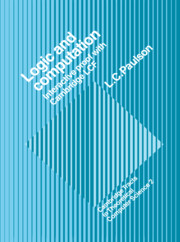4 - Structural Induction
Published online by Cambridge University Press: 17 September 2009
Summary
Reasoning about functional programs requires the ability to define interesting data structures in PPλ. In Scott's original calculus the only type constructor is function space: if σ and τ are types then so is the function type σ → τ. A fundamental data structure is the Cartesian product, the type σ × τ. Other data type constructors are the strict product, various sums, and lifting. Starting from atomic types, many data structures can be expressed. Each type constructor has constructor functions for creating elements of the type. For taking elements apart it may have destructor functions or else an eliminator functional.
Furthermore recursive type constructors are definable. Domain theory allows the solution of recursive domain equations involving sum, product, function space, and several other type constructors. Cambridge LCF provides a mechanism for defining PPλ types in a style similar to Standard ML datatype definitions: LCF can generate axioms to define a PPλ type recursively as the sum of products of types, with one constructor function for each summand of the type.
The constructor functions determine whether a type is strict or lazy. If a constructor function is not strict in all arguments then it can construct partial objects: objects that have undefined parts. The resulting type, if recursive, also contains infinite objects. An example is the type of lazy lists, which contains partially defined and infinite lists. If every constructor is strict in every argument, then the resulting strict type contains only finite objects.
- Type
- Chapter
- Information
- Logic and ComputationInteractive Proof with Cambridge LCF, pp. 77 - 136Publisher: Cambridge University PressPrint publication year: 1987



